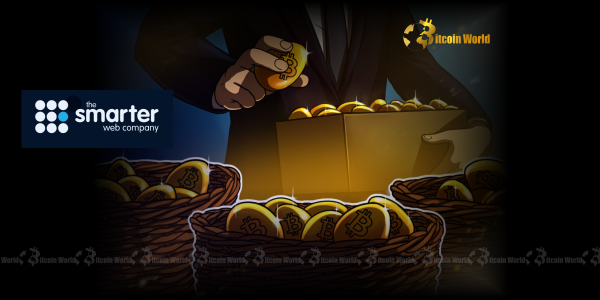BitcoinWorld

Bitcoin Treasury Boom: Decoding the Alarming Risks for Investors
The world of digital assets is constantly evolving, with new trends emerging that capture the attention of investors and corporations alike. One such phenomenon is the rise of Bitcoin treasury companies – firms that choose to hold significant amounts of Bitcoin on their balance sheets. While this strategy can signal confidence in the digital gold, it also comes with inherent complexities and risks. Recently, Fred Thiel, the astute CEO of Marathon Digital Holdings (MARA), a leading Bitcoin mining company, issued a cautionary note regarding this rapidly expanding sector. His insights provide a crucial reality check for anyone captivated by the allure of a Bitcoin treasury strategy.
Understanding the Bitcoin Treasury Phenomenon
What exactly are Bitcoin treasury companies, and why has this trend gained so much traction? Essentially, these are publicly traded or private companies that opt to convert a portion of their cash reserves or operational profits into Bitcoin. Unlike traditional investments, holding Bitcoin on a corporate balance sheet is a relatively new strategy, primarily popularized by pioneers like MicroStrategy.
The motivations behind this shift are multifaceted:
- Inflation Hedge: Many companies view Bitcoin as a potential hedge against fiat currency inflation, believing its finite supply will preserve purchasing power over time.
- Balance Sheet Optimization: For some, it’s a way to potentially generate returns on idle cash, especially in a low-interest-rate environment.
- Strategic Alignment: Companies deeply involved in the crypto ecosystem, like mining firms or exchanges, naturally integrate Bitcoin into their financial operations.
- Innovation and Forward-Thinking: Adopting Bitcoin can signal a company’s embrace of cutting-edge financial technologies and a belief in the future of digital assets.
The growth has been remarkable. Thiel noted that the number of companies with a significant Bitcoin treasury has swelled to over 200, collectively holding close to 774,000 BTC. This substantial accumulation represents a significant portion of Bitcoin’s circulating supply, underscoring the scale of this emerging corporate trend.
MARA CEO Fred Thiel’s Alarming Warnings on Bitcoin Treasury
Despite the apparent enthusiasm, MARA CEO Fred Thiel offered a sober assessment during a recent earnings call, highlighting potential pitfalls that could impact not only these companies but the broader Bitcoin market itself. His warnings are particularly significant given Marathon Digital Holdings’ own deep involvement in the Bitcoin ecosystem, albeit through mining rather than direct purchases for its treasury.
Thiel’s core concerns revolve around several critical points:
- Pressure on BTC Prices: The rapid accumulation of Bitcoin by these firms, while initially supportive of prices, could create an overhang. If many firms face distress simultaneously, their potential selling could exert downward pressure on Bitcoin’s value.
- Not All Firms Will Succeed: Thiel cautioned that the boom might not be sustainable for every participant. Just like any investment trend, not all companies jumping on the Bitcoin treasury bandwagon will navigate the volatile crypto markets successfully.
- Whale Selling Near Highs: He pointed out that significant market participants, often referred to as ‘whales,’ have been observed selling their Bitcoin holdings near recent market highs. This behavior can indicate a lack of conviction at elevated price levels, suggesting that even large holders see a ceiling.
- Risk of Forced Sales: A critical concern raised by Thiel is the potential for forced sales. If a company’s market-adjusted Net Asset Value (mNAV) weakens due to a decline in Bitcoin’s price or other financial pressures, they might be compelled to sell their Bitcoin holdings to meet operational costs, debt obligations, or maintain solvency.
- Sharper Reactions to Market Downturns: Thiel drew a stark contrast between Bitcoin treasury companies and Bitcoin Exchange-Traded Funds (ETFs). While ETFs are designed to track Bitcoin’s price and offer a regulated investment vehicle, treasury firms are operational businesses with other financial considerations. He argued that these treasury firms could react far more sharply and negatively to market downturns, potentially exacerbating price drops through panicked selling.
These warnings from an industry veteran like Thiel cannot be understated. They underscore the importance of understanding the underlying financial health and operational stability of any company that has adopted a Bitcoin treasury strategy.
The Intricate Risks of Bitcoin Treasury Holdings
Beyond Thiel’s specific points, a deeper dive into the risks associated with holding a substantial Bitcoin treasury reveals a complex landscape that requires careful navigation. Companies embarking on this path face challenges that differ significantly from traditional corporate finance.
Consider these intricate risks:
-
Extreme Volatility Exposure: Bitcoin is notorious for its price swings. While this volatility can lead to significant gains, it also exposes a company’s balance sheet to substantial paper losses during downturns. Unlike cash or traditional assets, Bitcoin’s value can halve in a matter of weeks, directly impacting a company’s reported assets and potentially its creditworthiness.
-
Liquidity Crunch and Forced Selling: As Thiel highlighted, a weakening mNAV or urgent need for cash could trigger forced sales. If multiple companies are in this position simultaneously during a market dip, it creates a negative feedback loop: selling drives prices down further, forcing more companies to sell, and so on. This scenario is distinct from ETFs, which typically have redemption mechanisms designed to handle outflows without necessarily triggering a fire sale.
-
Operational and Security Risks: Holding large amounts of Bitcoin necessitates robust security protocols. Companies must contend with the risks of hacking, theft, and internal fraud. Managing private keys, implementing cold storage solutions, and maintaining cybersecurity infrastructure are significant operational burdens and potential liabilities.
-
Regulatory Uncertainty: The regulatory landscape for cryptocurrencies is still evolving globally. Changes in tax laws, accounting standards, or outright bans could significantly impact the viability and attractiveness of a Bitcoin treasury strategy. Companies must constantly monitor and adapt to new legal frameworks.
-
Investor Confidence and Perception: While some investors applaud a company’s embrace of Bitcoin, others might view it as a risky and speculative move. A significant drop in Bitcoin’s price could lead to a loss of investor confidence, impacting stock prices and access to capital markets. The failure of even a few prominent Bitcoin treasury companies could cast a shadow over the entire sector.
It is crucial for both companies and investors to recognize that a Bitcoin treasury is not merely a passive investment but an active strategic decision with wide-ranging implications for financial health and market perception.
Navigating the Future of Bitcoin Treasury: What Investors Need to Know
Given the warnings and inherent risks, how should investors approach companies with a Bitcoin treasury? And what considerations should firms weigh before adopting such a strategy?
For investors, due diligence is paramount:
- Understand the Company’s Core Business: Is the Bitcoin holding supplementary to a strong core business, or is it the primary value driver? Companies with robust revenue streams independent of Bitcoin’s price are generally more resilient.
- Examine Their Treasury Management Strategy: Do they have a clear policy for managing their Bitcoin holdings? What are their risk mitigation strategies? Are they transparent about their mNAV and liquidity?
- Assess Debt and Leverage: Companies with significant debt or those that have leveraged their Bitcoin holdings are at higher risk during market downturns.
- Monitor Market Sentiment and Whales: Keep an eye on broader market trends, including the movements of large institutional holders, as suggested by Thiel.
For companies considering a Bitcoin treasury:
- Define Your Purpose: Clearly articulate why you are holding Bitcoin. Is it for speculation, inflation hedging, or operational necessity?
- Start Small and Scale Prudently: Avoid allocating an outsized portion of your balance sheet to Bitcoin initially.
- Implement Robust Risk Management: This includes security protocols, contingency plans for market downturns, and clear accounting practices.
- Communicate Transparently: Keep investors informed about your Bitcoin holdings, strategy, and the associated risks.
MARA itself presents an interesting case study. While it has raised significant capital ($940.5 million, as reported by The Block) to expand its Bitcoin holdings, its primary acquisition method is through mining, not purchasing on the open market. This distinction means its Bitcoin acquisition cost is tied to its operational efficiency rather than market buying prices, potentially offering a different risk profile compared to companies that solely buy BTC for their treasury.
The rise of the Bitcoin treasury signifies a growing acceptance of digital assets in corporate finance. However, as Fred Thiel of MARA wisely cautions, this boom is not without its perils. The allure of potential gains must be balanced against the very real risks of market volatility, liquidity crunches, and the operational challenges of managing a significant Bitcoin holding. Investors and corporations alike must exercise prudence, conduct thorough due diligence, and maintain a clear-eyed perspective on the long-term implications of these strategies. The future of corporate Bitcoin adoption will likely be shaped by those who can navigate these treacherous waters with foresight and robust risk management, ensuring that the promise of digital assets is realized without succumbing to unforeseen financial storms.
Frequently Asked Questions (FAQs)
Q1: What is a Bitcoin treasury company?
A Bitcoin treasury company is a firm that holds a significant amount of Bitcoin on its corporate balance sheet, often as an alternative to traditional cash reserves or as a strategic asset for growth and inflation hedging.
Q2: Why are MARA’s CEO’s warnings about Bitcoin treasury important?
Fred Thiel, CEO of Marathon Digital Holdings (MARA), is a seasoned executive in the Bitcoin mining sector. His warnings highlight potential systemic risks, such as forced sales and market pressure, that could arise from the rapid expansion of companies holding large Bitcoin treasuries, offering a critical perspective from within the industry.
Q3: How do Bitcoin treasury companies differ from Bitcoin ETFs in terms of risk?
While both involve Bitcoin exposure, Bitcoin treasury companies are operational businesses with diverse financial obligations. They might face pressure to sell Bitcoin to cover operational costs or debt, potentially reacting more sharply to market downturns. Bitcoin ETFs, conversely, are investment vehicles designed to track Bitcoin’s price, with redemption mechanisms typically focused on managing fund flows rather than operational solvency.
Q4: What are the main risks for companies holding a large Bitcoin treasury?
Key risks include exposure to extreme Bitcoin price volatility, the potential for liquidity crises leading to forced sales, significant operational and cybersecurity risks related to holding digital assets, and ongoing regulatory uncertainty that could impact their strategy and valuation.
Q5: What should investors consider before investing in a Bitcoin treasury company?
Investors should evaluate the company’s core business strength, its specific Bitcoin treasury management strategy, its debt levels, and its transparency regarding its holdings and risk mitigation. Understanding the company’s overall financial health beyond its Bitcoin exposure is crucial.
Did you find this article insightful? Share it with your network on social media to spread awareness about the evolving landscape of corporate Bitcoin treasury holdings and their potential implications for the market!
To learn more about the latest Bitcoin treasury trends, explore our article on key developments shaping Bitcoin treasury institutional adoption.
This post Bitcoin Treasury Boom: Decoding the Alarming Risks for Investors first appeared on BitcoinWorld and is written by Editorial Team





